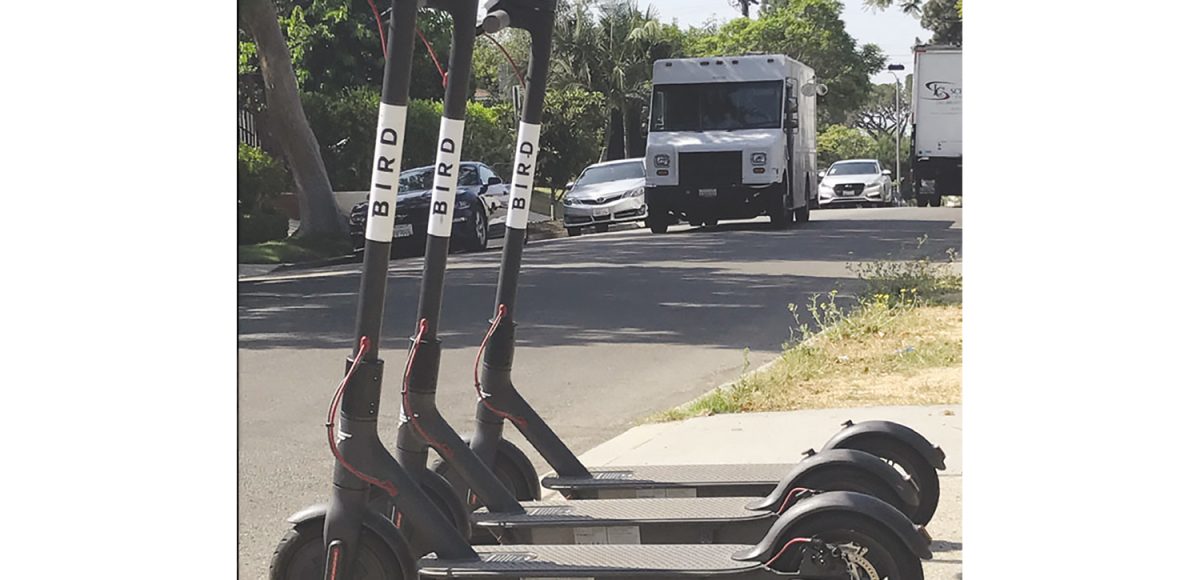Bird Riders, Inc. is suing the City of Beverly Hills, the Beverly Hills City Council and the Beverly Hills Police Department (BHPD) seeking an overturn of the City’s ban on e-scooters, restitution, attorney’s fees and the return of all impound fees, costs and expenses in a suit brought by O’Melveny & Meyers LLP.
“We are disappointed Bird has filed this lawsuit rather than addressing the safety problems that led to the adoption of our six-month prohibition on shared mobility devices,” said City Attorney Laurence Wiener. “At several public meetings, we heard testimony that these dockless scooters were consistently and illegally operated on the sidewalk posing a hazard to pedestrians. Also, they often blocked the public right-of-way when they were parked, making it almost impossible for seniors and the disabled to pass. That alone was sufficient to justify the temporary prohibition. Furthermore, the scooter riders almost always failed to wear helmets, thus endangering themselves in addition to the pedestrians. State law explicitly allows us to regulate these dockless scooters. We plan to continue to regulate them until we can work out the safety impacts. In the meantime, the City of Beverly Hills provides several mobility options in addition to traditional vehicles, most notably our shared bike program.”
The Beverly Hills Police Department has impounded over 1,000 scooters since the ordinance was passed, issuing 950 citations with over$100,000 in fines at $123 per scooter.
Scooters are defined as, “”any wheeled device other than an automobile or motor-cycle, that is powered by a motor; is accessed via an on-demand porta, whether smart-phone application, member-ship card, or similar method; is operated by a private entity that owns, manages and maintains the devices for shared use by members of the public; and is available to members of the public in unstaffed, self-service locations, except for those locations which are designated by the City.”
Bird has had eight administrative appeals to recover its property and to argue its case. Bird’s attorneys argue that the impounds are “illegal” and “improper” and conducted, “without evidence, without notice and without written decisions before they seized Bird’s property.”
They argue that the City does not notify them of impounds in a timely fashion, and that each day that the scooters are impounded they are not being rented, causing the company harm.
The suit claims that the City Council “unlawfully passed the Ordinance on an ‘urgency’ basis, dispensing with the state law requirement that prohibits any municipal ordinance from going into effect until 30 days after enactment.”
In their lawsuit, they state that “no testimony was given or findings made justifying urgency. Not a single witness indicated that electric scooters posed a serious and immediate danger to the public,” which they claim is in violation of the Brown Act.
The suit names three reasons the City Council banned scooters, which they disagree with. The first is that the scooters are “unregulated.”
That is untrue they say, because there are state laws that govern motorized scooters.
The argument does not take into consideration that the City banned “Shared Mobility Devices,” meaning dock-free, on-demand, pay-as-you-go mobility devices that typically are dropped wherever the rider ends the trip.
BHPD impounds scooters based on Section 22651(b) of the California Vehicle Code, authorizing the removal of a vehicle that is “parked or left standing upon a highway in a position so as to obstruct the normal movement of traffic or in a condition so as to create a hazard…”
Nonetheless, ride sharing for scooters was neither anticipated, nor regulated in Beverly Hills by any local ordinances. They simply appeared and soon, they were literally, every-where.
There were hundreds of them on the streets. Often, they were being driven by unlicensed kids, without helmets on streets and City sidewalks. The scooter riders competed for sidewalk space with pedestrians, handicapped and at-risk elderly or fragile people, and on the streets, where the council said they posed a traffic danger.
The second issue is that the City Council alleged that “the Bird scooters are ‘abandoned’-by which they really meant just parked, not abandoned as that term is used under State law ‘by users in streets, sidewalks, and other places.”
“But that is true of scooters owned by private individuals and bicycles,” says the lawsuit.
Privately-owned scooters are not often found in the pub-lic right-of-way or in parks and on sidewalks unless the rider is present, especially motorized scooters. When such items are privately owned, they are usually safeguarded as a personal item.
In Beverly Hills, Bird scooters, however, were found dumped in Metro construction sites, street medians, public sidewalks, private driveways, parks, and generally anywhere the rider dropped them. It was actually almost comical so much so that scooters left in strange places started to appear on Pinterest, Twitter and Instagram.
Soon after they began to appear, some of the devices fell victim to anonymous scooter rage, ending up broken in pieces or otherwise disabled, in the public right-of-way. This too, became the subject of social media posts.
Third, claims the lawsuit, “the City Council cited the ‘appeal to young people’ as a problem, without explanation or support why it was a problem, and pointing out that ‘shared mobility devises are nearly always operated by users without helmets.'”
As of Sept. 18, state law no longer requires users over the age of 18 to wear helmets. The ordinance went into effect on July 26.
The company claims that the City of Beverly Hills is violating the California Environmental Quality Act by denying the use of a zeroemissions e-scooter.”
BEVBEVERLERLYY HI HILLSLLS
Attempts to speak to some-one at Bird were rejected and referred to a standard press release.
In it, Eric Estrada, Bird’s chief legal officer and head of Government Partnerships, positions the company as almost a messianic answer to modern environmental and traffic issues. “The Beverly Hills ban also violates the California Environmental Quality Act, which requires the City Council to conduct a review of the environmental consequences of removing zero emissions transportation options, such as e-scooters,” read the press release. “The City Council failed to conduct a CEQA review, arguing the ban would have no impact on the environment – an assertion that runs contrary to logic and facts showing that use of Bird’s zero-emissions vehicles decreases CO2 emitting car trips.”
It may be that the scooter has a place in filling transportation needs, but the aggressive introduction of scooters into Beverly Hills did little to enhance their standing.
Tim Harter, government relations for Bird, explained that the business model for the company is to discover if there is anything that “prohibited us from operating,” in a given locale, he told the City Council in their July hearing. When it is determined that the company can introduce the vehicles, they bring their scooters into the city or into nearby cities, like Santa Monica, Los Angeles and Culver City, affecting Beverly Hills, West Los Angeles and West Hollywood.
The strategy then over-whelms the cities with scooters, forcing them to negotiate with the city’s government.
Councilmember Les Friedman called it, “asking for forgiveness, rather than “asking for permission.”
Mayor Julian Gold was very forthcoming. “I am beyond offended by the manner in which this was rolled out. To intentionally impose on cities the risks in an effort to make a profit is unconscionable. No one has to grant forgiveness. The manner in which you rolled this out is a wanton disregard for the public safety and it is our public. You guys could care less. You want-ed to move the needle. You moved it too far. This is a wan-ton disregard for public safety. Given my ‘druthers I would ban you for life or longer I would stick your executives in jail and not the kids who ride the scooters.”
The Urgency Ordinance passed 4-1, with John Mirisch the dissenting vote.






